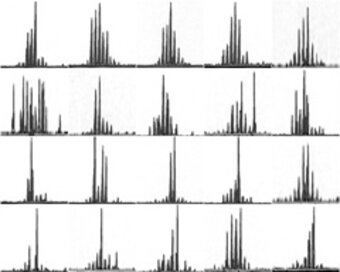Genetic disorders of T cell development, activation and differentiation: Profound Combined Immunodeficiencies (P-CID)

TCR-Spectratyping by P. Fisch
Summary
Combined immunodeficiency (CID) is the phenotypic presentation of a large number of genetic disorders of the immune system. Clinical manifestations include a wide range of infectious diseases including persistent viral and opportunistic infections and manifestations of impaired immune regulation such as autoimmunity, eczema, granulomas or infl ammatory bowel disease. The common immunological abnormality is impaired T cell immunity, but other immune and epithelial cells can also be affected. The study of CID offers a unique opportunity to understand the limiting factors of protective T cell immunity. We approach this problem by the study of individual patients, patient cohorts and mouse models. To transfer this knowledge to patient care, a prospective clinical study has been initiated to better define the threshold when stem cell transplantation should be performed in affected patients.
In the laboratory, we perform a careful phenotypic and functional immunological analysis. In some cases, we identify mutations in known genes and can then analyze the consequence of specific mutations for protein and cellular immune function. In other cases, we use functional assays in combination with exome sequencing (collaboration with Klaus Schwarz, Ulm) to elucidate novel genetic causes for CID. These findings are related to the particular clinical phenotypes with the goal to better understand infection control and immune regulation in humans. We also use mouse models of “leaky” SCID that show features of infection susceptibility and immune dysregulation similar to human patients. In particular, we study T cell development and differentiation and T cell mediated control of viral infections. The overall goal is to understand how human T cell immunity works under limiting conditions.
Methods
- Flow cytometry
- Functional immune cell analysis
- Signalling studies
- Protein studies
- Cell culture
- Interpretation of genome/exome data
- Genetic manipulation of human T cells
- Mouse models
Cooperations
- Paul Fisch, Molekulare Pathologie, Pathologisches Instituts, Uniklinik Freiburg
- Klaus Schwarz, Institut für Transfusionsmedizin, Universität Ulm
- Wolfgang Schamel, Institute of Biology III, Universität Freiburg
- Alessandro Aiuti, Milano, Italy
- Despina Moshous, Capucine Picard, Institute Imagine, Paris, France
Funding
- BMBF: CCI Professorship Pediatric Immunology (2013-2018)
- DFG: Genetic, immunologic and phenotypic variability of combined immunodeficiencies (2014-2017)
- DFG: Euro-CID – Non-SCID combined immunodeficiencies (2016-2019)
Publications
- Omenn syndrome associated with a functional reversion due to a somatic second-site mutation in CARD11 deficiency. Fuchs S, Rensing-Ehl A, Pannicke U, Lorenz MR, Fisch P, Jeelall Y, Rohr J, Speckmann C, Vraetz T, Farmand S, Schmitt-Graeff A, Krüger M, Strahm B, Henneke P, Enders A, Horikawa K, Goodnow C, Schwarz K, Ehl S. Blood. 2015 Oct 1;126(14):1658-69.
- Deficiency of innate and acquired immunity caused by an IKBKB mutation. Pannicke U, Baumann B, Fuchs S, Henneke P, Rensing-Ehl A, Rizzi M, Janda A, Hese K, Schlesier M, Holzmann K, Borte S, Laux C, Rump EM, Rosenberg A, Zelinski T, Schrezenmeier H, Wirth T, Ehl S*, Schroeder ML*, Schwarz K*. (equal contribution) N Engl J Med. 2013 Dec 26;369(26):2504-14.
- ORAI1-mediated calcium influx is required for human cytotoxic lymphocyte degranulation and target cell lysis. Maul-Pavicic A, Chiang SC, Rensing-Ehl A, Jessen B, Fauriat C, Wood SM, Sjöqvist S, Hufnagel M, Schulze I, Bass T, Schamel WW, Fuchs S, Pircher H, McCarl CA, Mikoshiba K, Schwarz K, Feske S, Bryceson YT, Ehl S. Proc Natl Acad Sci U S A. 2011 Feb 22;108(8):3324-9.
- Clinical and immunologic consequences of a somatic reversion in a patient with X-linked severe combined immunodeficiency. Speckmann C, Pannicke U, Wiech E, Schwarz K, Fisch P, Friedrich W, Niehues T, Gilmour K, Buiting K, Schlesier M, Eibel H, Rohr J, Superti-Furga A, Gross-Wieltsch U, Ehl S. Blood. 2008 Nov 15;112(10):4090-7.
- A variant of SCID with specific immune responses and predominance of gamma delta T cells. Ehl S, Schwarz K, Enders A, Duffner U, Pannicke U, Kühr J, Mascart F, Schmitt-Graeff A, Niemeyer C, Fisch P. J Clin Invest. 2005 Nov;115(11):3140-8.
For an up-to-date list of publications by Prof. Stephan Ehl please see the PubMed search.

Prof. Dr. med. Stephan Ehl
MEDICAL CENTER - UNIVERSITY OF FREIBURG
Center for Chronic Immunodeficiency
at Center for Translational Cell Research
Breisacher Str. 115
79106 Freiburg
Germany
Phone: +49 (0)761 270-77550 (Secretary)
Fax: +49 (0)761 270-77600
stephan.ehl@uniklinik-freiburg.de

